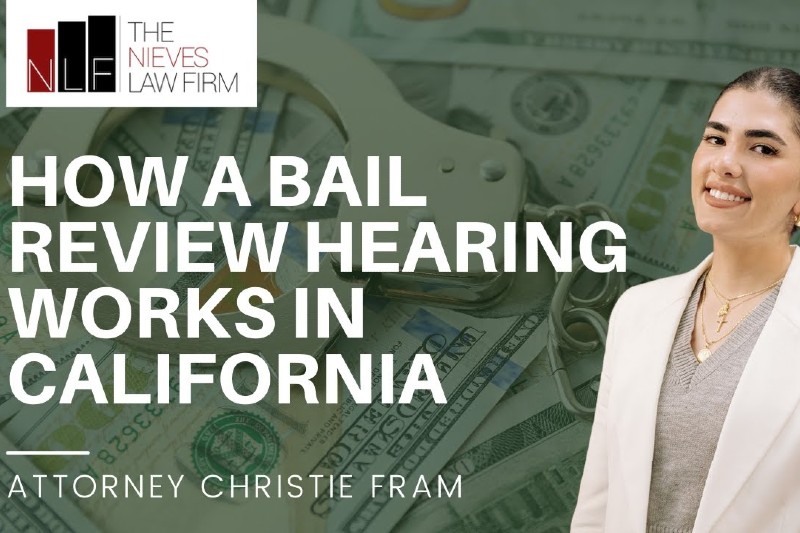What is a Bail Review Hearing in California?

When and Why You Might Get a Second Chance at Bail
When someone is arrested in California, they don’t necessarily have to remain in custody while their case makes its way through the court system. Bail exists to allow defendants to remain free while ensuring they’ll return for future court appearances. But what happens when the initial bail amount is too high, or bail is denied completely? This is where bail review hearings come into play.
What Exactly Is a Bail Review Hearing?
A bail review hearing is a court proceeding where a judge reconsiders the initial bail determination. During this hearing, your attorney can argue for:
- Reducing the bail amount
- Changing bail conditions
- Releasing you on your own recognizance (OR), which means no bail payment is required
These hearings provide a critical opportunity to address bail amounts that may be excessive or unaffordable, especially for defendants who don’t pose a flight risk or danger to the community.
How Bail is Initially Set in California
Before we dive deeper into bail review hearings, it’s important to understand how bail gets set in the first place. When someone is arrested in California, one of three things typically happens:
- Bail is set according to a county bail schedule – Each county has a standardized schedule with preset amounts based on the offense
- Bail is denied – Usually reserved for serious felonies or when the defendant poses a significant public safety risk
- A bail hearing is scheduled – To determine appropriate release conditions
For many defendants, the preset bail amount can be prohibitively high, making a bail review hearing necessary.
Factors the Judge Considers During a Bail Review Hearing
During a bail review hearing, judges don’t make decisions arbitrarily. They weigh several important factors to determine whether to adjust bail or release conditions:
1. Seriousness of the Alleged Offense
The nature and circumstances of the charges play a significant role:
- Is it a misdemeanor or felony?
- Was a weapon involved?
- Were there injuries or property damage?
- Is it a violent crime?
Generally, more serious offenses result in higher bail amounts, while minor offenses may warrant a reduction or OR release.
2. Community Ties
Strong community connections suggest a defendant is less likely to flee:
- Length of residence in the community
- Family relationships (especially dependents like children)
- Employment history and stability
- Property ownership
- Involvement in community organizations
The stronger these ties, the better case you have for reduced bail or OR release.
3. Criminal History
Your past record can significantly impact bail decisions:
- Prior convictions, especially for similar offenses
- History of failing to appear for court dates
- Previous probation or parole violations
- Outstanding warrants
A clean record or minimal criminal history strengthens your position for favorable bail terms.
4. Public Safety Concerns
Judges must consider whether your release would endanger others:
- Risk of reoffending while on release
- Potential threats to victims or witnesses
- History of violent behavior
- Mental health considerations
5. Flight Risk Assessment
The likelihood you’ll return for future court appearances is crucial:
- Past instances of failing to appear
- Ties to other states or countries
- Financial resources that could facilitate fleeing
- Severity of potential penalties (which might increase motivation to flee)
How to Prepare for a Bail Review Hearing
Successful bail review hearings require preparation. Here’s how to strengthen your case:
Gather Supporting Documentation
Collect evidence demonstrating your community ties and reliability:
- Proof of employment (pay stubs, letter from employer)
- Rental agreements or mortgage statements
- Marriage certificates or birth certificates for children
- Letters from community members, religious leaders, or employers
Develop a Supervision Plan
Judges often look favorably on structured supervision arrangements:
- Propose living with family members who can help ensure court attendance
- Suggest enrollment in treatment programs if substance abuse is a factor
- Offer to accept electronic monitoring
- Present a plan for regular check-ins with pretrial services
Address Past Failures to Appear
If you have previously missed court dates, be prepared to explain:
- Why it happened (miscommunication, transportation issues, etc.)
- What’s different now
- Safeguards you’ll implement to ensure attendance
Legal Representation at Bail Review Hearings
Having an experienced criminal defense attorney at your bail review hearing can make a tremendous difference in the outcome. A skilled attorney will:
- Understand local court practices and judicial temperaments
- Prepare compelling arguments tailored to your specific circumstances
- Challenge inaccurate information about your case or background
- Negotiate with prosecutors who may oppose bail reduction
- Present your community ties and support system effectively
California Bail Reform and Recent Changes
California’s bail system has undergone significant changes in recent years. Following a California Supreme Court ruling in In re Humphrey (2021), judges must now consider a defendant’s ability to pay when setting bail. This means that excessively high bail amounts that effectively detain someone solely because they cannot afford bail may be unconstitutional.
The court must now:
- Consider non-financial alternatives to money bail
- Evaluate a defendant’s financial resources
- Set bail at an amount the defendant can reasonably afford
- Only deny bail when less restrictive alternatives would not protect public safety
These changes have made bail review hearings even more important for defendants seeking fair release conditions.
After the Bail Review Hearing: Possible Outcomes
Following your bail review hearing, the judge will issue a decision that typically falls into one of these categories:
- Reduced bail – The judge lowers the amount required for release
- Own recognizance release – You’re released without monetary bail, based on your promise to return
- Modified conditions – Bail amount remains the same, but other conditions change (like adding electronic monitoring)
- Denial of modification – Original bail conditions remain in place
- Supervised release – Release with specific supervision requirements
If the outcome isn’t favorable, your attorney can advise you on next steps, which might include another review hearing if circumstances change.
How The Nieves Law Firm Can Help
At The Nieves Law Firm, we understand the critical importance of bail review hearings. Being detained while your case proceeds can have devastating effects on your life, employment, and family relationships.
Our attorneys bring powerful advocacy to bail review hearings by:
- Building persuasive presentations of your community ties
- Addressing concerns about public safety or flight risk
- Leveraging our knowledge of local courts and judges
- Presenting alternatives to high cash bail
- Arguing effectively for your constitutional rights
We know that each case is unique, and we tailor our approach to your specific situation and needs.
Take Action Now
If you or a loved one is facing high bail amounts or a bail denial, don’t wait to seek help. The sooner we can begin preparing for a bail review hearing, the better your chances for a favorable outcome.
Contact The Nieves Law Firm today for a consultation. We’re ready to fight for your freedom while your case moves forward.



